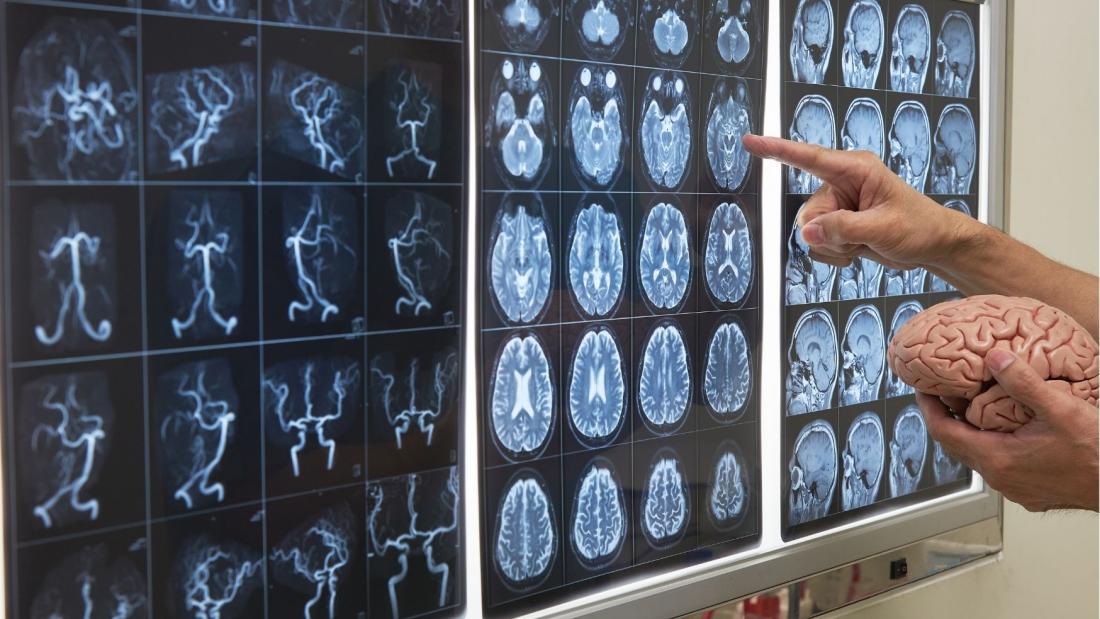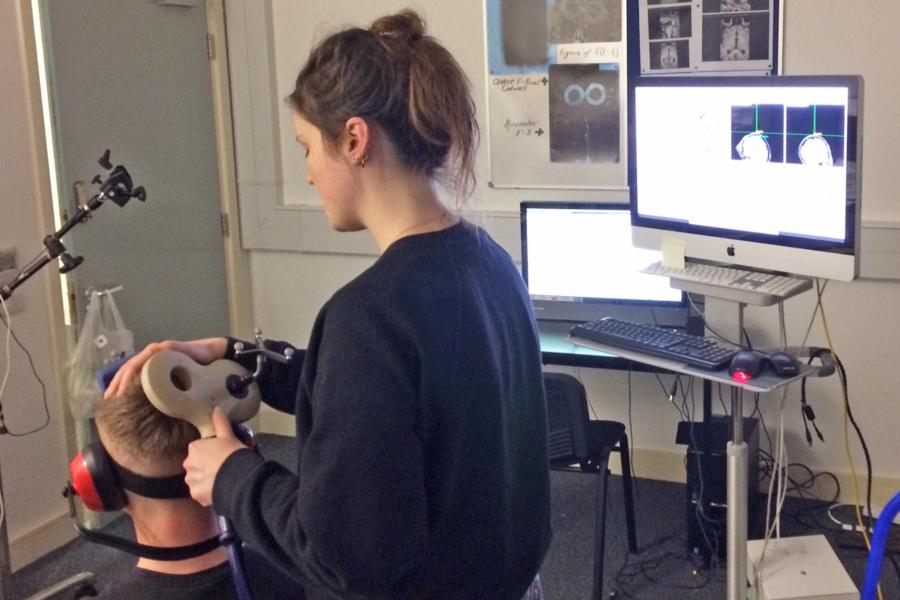Open Access Labs
In addition to dedicated individual laboratories for research-active staff, Psychology has a number of state of the art open-access research facilities and services.
Bangor Imaging Unit
The School of Human and Behavioural Sciences has its own research dedicated MRI/fMRI facility in the Psychology building. Facilities within the Bangor Imaging Unit include a research and teaching dedicated 3 Tesla Magnetic Resonance Imaging scanner, MRI compatible EEG, transcranial magnetic stimulation (TMS), stimulus presentation systems, and eye tracking systems. In addition to anatomical and functional MRI, the scanner is equipped for 4D cardiac, diffusion tensor imaging (DTI) and magnetic resonance spectroscopy (MRS).
Staff and students interested in scanning participate in a weekly talk series linked to issues and research pertaining to brain imaging.
Open- Access Electrophysiology Lab
Expertise in electrophysiological methods (EEG/ERP) is a particular strength of Psychology academics within our School. In addition to five independent EEG labs associated with specific staff, the School offers an open-access electrophysiology lab. The Psychology Open-Access Electrophysiology and Topographic (POET) lab provides access to EEG / ERP research facilities for all School research staff and supports students and researchers. The lab consists of a fully shielded sound-attenuated testing booth,128 channel BioSemi EEG system, and all equipment necessary for auditory and visual EEG/ERP experiments. The POET lab also includes a computer lab available for data analysis. A variety of stimulus presentation and data analysis software packages are available to accommodate individual user needs and preferences.
The lab also includes an SR-Research Eyelink 1000 eye tracking system. Please contact Dr Manon Jones for additional information.
Brain Stimulation Lab
Electrophysiology and brain imaging techniques are useful to measure the activity of the brain when it is engaged in a task. However, to directly test whether a specific brain area is necessary to perform a task, or to explore how a brain area processes information, non-invasive brain stimulation methods can be used.
The Brain Stimulation Lab within Psychology is equipped with two different types of stimulation equipment, transcranial magnetic stimulation (TMS) and transcranial direct current stimulation (tDCS).
Research Support
Participant Panels
Several participant panels are available to help researchers in Psychology recruit participants from special populations. The participant panels are supported by grants and school funds. A charge may be applied for using these services. Participant information is kept confidential according to the data protection act and BPS ethical guidelines. Contact information is only available for potential participants who agreed to be contacted by researchers in the School. Access to participant information is also subject to approval by specific research groups (e.g. the Neurology Group), and the Research Ethics Committee. If you are staff or a postgraduate researcher within the School and would like to use these services, please contact Becca Henderson in the first instance. Due to demand, we are unable to offer these services to researchers outside the School.
- Student Panel (SONA)
- Community Participant Panel: The Community Panel includes subgroups and may be helpful for identifying: Bilinguals, People with Dyslexia, and the Elderly
- Infant/ Child Development Database
- Neurology Patients
Custom Research Equipment and Programming Services
Research technical hardware and software interfacing support is available for research labs including bespoke experimental builds, embedded hardware systems, 3D-printing, laser-cutting, data analysis routines, etc. Interfacing and data transfer expertise is available in Python, Matlab, PsychoPy, Presentation and E-Prime, etc. For information on these services, please get in touch.
Research technical software and programming support is available for research, including Visual Basic, LabView, E-Prime, C++, C#, National Instruments Data Acquisition, Web-based applications, motion-analysis systems e.g. Vicon and Optotrak.
For information on these services, please contact labs.
Bangor University Psychology Tour
360 Psychology Tour Transcript
The Brigantia Building on College Road houses academic and administrative offices for Psychology.
Psychology undergraduates will visit Brigantia when they need to meet with personal tutors and project supervisors, as well as when they tend to various administrative aspects of student life.
The Department of Psychology has its own research dedicated MRI/fMRI facility in the Brigantia building. Facilities within the Bangor Imaging Unit include a research and teaching dedicated 3 Tesla Magnetic Resonance Imaging scanner, MRI compatible EEG, transcranial magnetic stimulation (TMS), stimulus presentation systems, and eye tracking systems. In addition to anatomical and functional MRI, the scanner is equipped for 4D cardiac, diffusion tensor imaging (DTI) and magnetic resonance spectroscopy (MRS).
The Miles Dyslexia Centre provides language and literacy teaching support and assessment for children and adults. The Centre also conducts research into the neurocognitive and behavioural basis of reading and writing. The Miles Dyslexia Centre comprises of a team of researchers and educational practitioners, developing best-practice teaching and assessment methods, combined with cutting-edge scientific research.
The Lloyd Building on College Road houses a number of different research labs used by students and researchers within the Department of Psychology at Bangor University.
The Department of Psychology has open-access eye-tracking facilities in the Lloyd building. Facilities within the Open Access Eye-Tracking lab include a remote eye-tracker Eyelink 1000 plus, HD LCD monitors, Ultravoice Dynamic Cardioid Vocal Microphone, audio mixer, and over ear headphones.
Eye trackers work by using infrared light to track the position of the eyes. In this lab, a chin rest is also available to help stabilise the participant’s head and to ensure that their eyes are at the correct distance from the eye tracker.
The Department of Psychology has open-access electrophysiology and topographic facilities in the Lloyd building. Facilities within the Psychology Open-access Electrophysiology and Topographic (POET) Lab include ActiveTwo multi-channel high resolution biopotential measurement system from BioSemi, pin-type active electrodes, EEG headcaps. The lab also includes a remote eye-tracker Eyelink 1000 plus for EEG measurements with simultaneous eye tracking.
In the POET lab, participants are tested inside an electrically shielded Faraday cage with acoustic dampening. Faraday cages are used to enhance the quality of the EEG data by blocking electromagnetic signal interference from the measurement room.
In this lab, there are also cameras and an intercom system available for researchers to regularly check on the participants during the testing session. This ensures that the participants don’t feel too isolated from the outside world whilst inside the testing room.
In the control room, there are three desktop computers dedicated to data analysis.
The Department of Psychology has a 3-D vision and hand function laboratory that contains a Qualisys Miqus motion capture system for precise measurement of hand movements, as well as various bespoke pieces of equipment, including visual displays for presenting virtual 3-D visual stimuli, and tools and simulated prostheses for studying use of mechanical devices
The lounge area in the Wheldon Building is equipped with a printer, a vending machine, and comfortable seating options, where students can sit and chat with their peers before their classes, or study in a relaxed atmosphere.
The Wheldon Building's computer lab is a versatile facility equipped with 80 computers. This lab supports a range of practical sessions, such as statistics and academic writing.
Pontio is Bangor University’s arts and innovation centre. Some of the modules offered by the Department of Psychology are delivered in Pontio Level 5, a large lecture theatre that can seat up to 450 students.
When using the MRI scanner to take images of the brain, it is of vital importance that participants keep their head (and body) as still as possible. The Brigantia building houses a state-of-the-art mock scanner that is equipped with a sound system to play scanner sounds, and MoTrak, a software which allows fine-grained head motion tracking. The mock scanner is designed to familiarise participants, particularly children, with being in the scanner environment.
This lab contains a unique prototype stereoscopic 3-D display designed to investigate how we see in 3-D and in particular to explore solutions to various problems experienced when using media such as VR systems, 3-D movies etc. As well as perceptual measures of depth perception, the system can measure where the eyes are looking, and the distance at which eye’s lens is focused. The experiments require that only the experimental stimuli are visible, and so the room is blacked out when in use.
The Brigantia building houses a state-of-the-art EEG lab that features two testing booths, including BioSemi systems for high-resolution biopotential measurement, and CRT monitors for displaying visual stimuli during testing sessions. The lab is also equipped with several EEG caps. The testing booths are designed to provide a quiet and controlled environment for data collection. Researchers can also monitor participants during testing sessions using cameras and an intercom system to ensure their safety and comfort.


